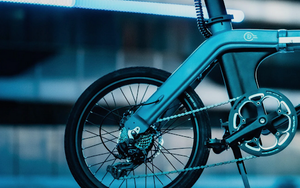What Are The Pros And Cons of Electric Scooters?
Feb 09, 2024
Table of Contents:
-
What are the pros and cons of electric scooters?
-
The basic of electric scooters
-
How do electric scooters work?
-
The advantages of electric scooters
-
The disadvantages of electric scooters
-
Making an informed decision
-
Conclusion
What are the pros and cons of electric scooters?
Electric scooters have been gaining popularity as an eco-friendly and convenient mode of transportation. In this article, we will explore the pros and cons of electric scooters to help you understand if they are the right choice for you.
The Basics of Electric Scooters
Electric scooters, also known as e-scooters, are powered by rechargeable batteries and use electric motors for propulsion. They are similar to traditional scooters, with the main difference being their power source. Electric scooters offer a greener alternative to gas-powered vehicles, emitting zero emissions and reducing air pollution.
Electric scooters have gained popularity in recent years due to their convenience and environmental benefits. They are lightweight and compact, making them easy to manoeuvre through traffic and park in crowded urban areas. Additionally, they are cost-effective, as they require less maintenance and have lower operational costs compared to traditional scooters.

How Do Electric Scooters Work?
Batteries
Electric scooters derive their power from lithium-ion batteries, which provide the necessary energy to drive the motor. These batteries can typically be recharged by plugging them into a standard electrical outlet. The motor's power is controlled by a throttle, allowing riders to vary their speed.
Throttle
The throttle on an electric scooter works similarly to the accelerator pedal on a car. By twisting or pressing the throttle, the rider can increase or decrease the scooter's speed. This provides a smooth and responsive riding experience, allowing riders to easily navigate through different terrains and traffic conditions.
Regenerative Braking
In addition to the throttle, electric scooters often feature regenerative braking systems. When the rider applies the brakes, the scooter's motor acts as a generator, converting the kinetic energy of the scooter into electrical energy. This energy is then stored in the battery, increasing its overall efficiency and extending the scooter's range.
Advanced Features
Some electric scooters also come equipped with advanced features such as LED headlights, taillights, and turn signals, enhancing visibility and safety on the road. These features are especially beneficial for riding at night or in low-light conditions. The Ducati Pro-II Evo Electric Scooter features front and rear LED lights.
Overall, electric scooters offer a convenient and eco-friendly mode of transportation. With advancements in battery technology and increased availability, they are becoming a popular choice for commuters and urban dwellers looking for a sustainable alternative to traditional scooters and cars.

The Advantages of Electric Scooters
Environmental Impact
One of the key advantages of electric scooters is their positive impact on the environment. According to a recent study, electric scooters produce up to 80% less carbon dioxide emissions compared to traditional gas-powered vehicles. This reduction in emissions plays a crucial role in combating climate change and improving air quality.
Cost Efficiency
Electric scooters are not only environmentally friendly but also cost-effective. Unlike gas-powered vehicles, electric scooters require less maintenance, as they have fewer moving parts and do not rely on gasoline. Additionally, the cost of electricity to charge an electric scooter is significantly lower than the cost of gasoline, making them a cheaper transportation option in the long run.
Convenience and Mobility
Electric scooters offer unparalleled convenience and mobility. With their compact size and lightweight design, they can easily navigate through congested urban areas and narrow streets where larger vehicles may struggle. Furthermore, electric scooters can be parked in small spaces, eliminating the hassle of finding parking spots, a common challenge in urban environments. The Kugoo G2 Pro Electric Scooter has a foldable design making it perfect for commuters.

The Disadvantages of Electric Scooters
Safety Concerns
While electric scooters offer numerous advantages, safety concerns need to be addressed. According to a report by the National Association of City Transportation Officials (NACTO), injuries and accidents involving electric scooters have been on the rise. The lack of protective barriers, high speeds, and inexperienced riders contribute to these incidents. It is crucial for riders to wear protective gear, adhere to traffic regulations, and undergo proper training to ensure their safety.
Battery Life and Range Limitations
Another concern with electric scooters is their limited battery life and range. Depending on the model, electric scooters can travel between 15 to 50 miles on a single charge. This range may be limiting for individuals who rely on their scooters for daily commuting or longer trips. However, advancements in battery technology are constantly improving, and newer models are offering increased range and improved battery life.
Regulatory and Legal Issues
The growing popularity of electric scooters has led to regulatory and legal challenges in many cities. Some municipalities have imposed restrictions on e-scooter use, including speed limits, designated lanes, and regulations related to riders' age and licences. It is important for riders to familiarise themselves with local laws and regulations to avoid fines and legal complications.
For example, in the UK it is currently illegal to use a privately owned electric scooter on public roads, pavements or cycle lanes. However, you can use them on privately owned land. It's important to check through laws thoroughly wherever you are.

Making an Informed Decision
Factors to Consider When Buying an Electric Scooter
Before investing in an electric scooter, several factors need to be considered. These include the scooter's:
- Weight
- Battery life
- Speed capabilities
- Charging time
- Additional features such as suspension and lights.
Additionally, it is essential to assess your transportation needs, such as the distance of your daily commute and the terrain you will be riding on.
Maintenance and Care for Electric Scooters
Proper maintenance and care are crucial for ensuring the longevity and performance of your electric scooter. Regularly inspecting tires, brakes, and lights is essential. It is also important to keep the scooter clean and dry, especially after riding in wet weather conditions. Following the manufacturer's guidelines for battery maintenance and charging will help extend its lifespan.
Future Trends in Electric Scooter Technology
The electric scooter industry continues to evolve, with exciting advancements on the horizon. Engineers are working on developing new battery technologies that offer longer range and faster charging capabilities. Furthermore, smart features, such as GPS tracking and mobile app integration, are being integrated into electric scooters to enhance their functionality and improve user experience.
Conclusion
In conclusion, electric scooters have numerous advantages, including their positive environmental impact, cost efficiency, and convenience. However, safety concerns, battery life limitations, and regulatory issues must be considered. By evaluating your needs and conducting thorough research, you can make an informed decision about whether electric scooters are the right choice for you.






